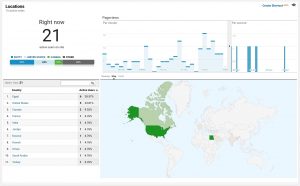
Analytics at 3:15 pm on February 16, 2018
It’s fascinating to watch Archnet‘s real-time statistics in Google Analytics. There’s no reason why I need to monitor the statistics in real-time, but it is definitely interesting to see how many people are using the site and any specific time, where they are from, and what they are looking at.
Yesterday afternoon was interesting. When I checked in just after 3:00 pm EST, there were 21 users on Archnet from 11 different countries, as shown in the screen capture. Our visitor numbers can vary significantly depending on the time of day, but in general it stays pretty busy from noon to about 20:00 hours GMT. In general Archnet gets the most visitors from India, the United States, and Egypt, in that order. So it follows that these would be our busiest time. 12:00 GMT is 14:00 in Cairo, 07:00 in Boston, and 17:30 in Mumbai. Continue reading





